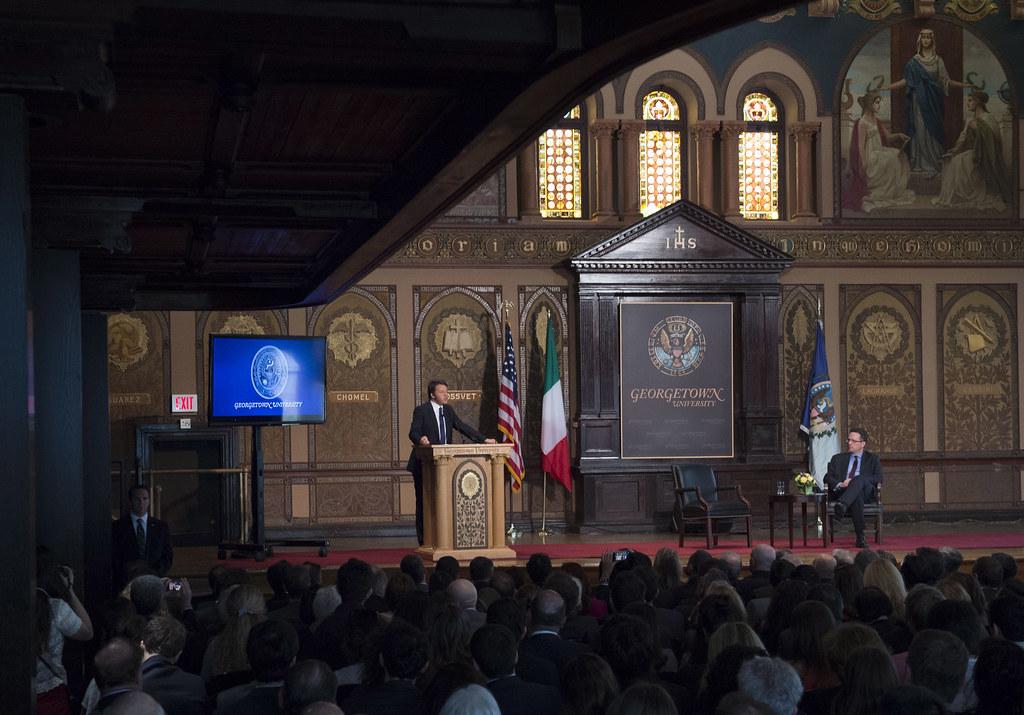Georgetown University’s School of Foreign Service (SFS) and Center for Security Studies (CSS), along with the Center for Security and Emerging Technology (CSET), hosted the Kalaris Intelligence Conference Nov. 1.
The event, held in Gaston Hall, was titled “Decision Advantage: Emerging Technology Opportunities and Challenges for U.S. Intelligence.” Panelists discussed the rapidly evolving pace of technology and technology policy, as well as how U.S. intelligence can leverage innovations in the international sphere.
The conference’s keynote speaker was Stacey Dixon, principal deputy director of national intelligence for the Biden administration. The event also featured a conversation between Ambassador Bonnie Jenkins, undersecretary of state for arms control and international security, and Reggie Brothers, operating partner at AE Industrial Partners, an aerospace private investment firm.
“Rapid innovation is changing every aspect of intelligence,” Daniel Byman, director of CSS, said at the event.
The rest of the conference consisted of panel discussions on the United States’ role in promoting innovation and protecting critical technology, in addition to the emerging role of technology and volunteer tech companies in the war in Ukraine.

Andrew Imbrie, an associate professor of the practice and the Gracias Chair in security and emerging technology at the SFS and the faculty lead for the conference, said he hopes that the conference will analyze how the U.S. intelligence community can use the rapid innovation changing the field to effectively deploy new strategies in the international sphere.
“This year’s conference will explore how the United States can leverage emerging technologies to gain a competitive edge at home and abroad,” Imbrie wrote to The Hoya. “The U.S. government has an array of tools to accomplish its goals, from research and development to export controls to intelligence sharing to diplomacy and public-private partnerships.”
“Tensions and tradeoffs are inevitable, but the demand for wise technology stewardship is indispensable. Adaptability is the watchword,” Imbrie added.
According to Dewey Murdick, executive director of CSET, one of the most pressing issues to which the U.S. and international intelligence communities will have to adapt is generative AI and its future capabilities.
“Advances in AI can fundamentally change the risk of exposure for covert agents and can make secure communications more difficult to intercept, compelling the Intelligence Community to rethink its conventional methods,” Murdick wrote to The Hoya.
Murdick said this year’s conference is particularly relevant because of the Biden administration’s Oct. 30 executive order on AI, which sets new standards for AI-related safety, security and privacy; promotes innovation; and ensures responsible use of AI.
“This year’s focus on leveraging AI to fortify our national security couldn’t be more timely, especially in light of Monday’s Executive Order on AI,” Murdick wrote.
The evolution of AI and other technology was also a common theme in the conference’s second panel, “Volunteer Force: Tech, Tech Companies, and Ukraine.”
Col. Joseph O’Callaghan, a U.S. army director and fire support coordination cell in the XVIII airborne corps, spoke during the panel about the need to adapt to evolving technology.
“We’re in a different world today,” O’Callaghan said at the event. “If you turned on the TV a year ago and you turned on the TV today, it’s the difference between looking at a flip phone in combat to a modern iPhone or something of that nature. Technology is moving exceptionally quick, and if we’re not able to adapt and employ that technology, we’re going to fall behind those who can.”
Panel moderator Emelia Probasco, a senior fellow at CSET, also noted the impact of technology on the rising number of public-private partnerships in the intelligence community.
“The goal, I think, is to help folks get a broader understanding for how companies are having an impact and to maybe further the conversation on what role companies should take when we’re in a conflict and what role the government should have relative to those companies,” Probasco told The Hoya.
“It was really heartening to see what private companies like Amazon and Microsoft — even Starlink and SpaceX — did to support the Ukrainians in the wake of the Russian invasion. But that was pretty new territory,” Probasco added.
Gen. John Allen, a strategic advisor for Microsoft Corporation and retired U.S. Marine Corps four-star general, said the rapidly accelerating pace of new innovation and technology, particularly in warfare, will become so great that humans’ role will transform.
“We’ll be moving so fast that at some point we will have to call into question the role of the human being in the process of decision-making,” Allen said at the event.







